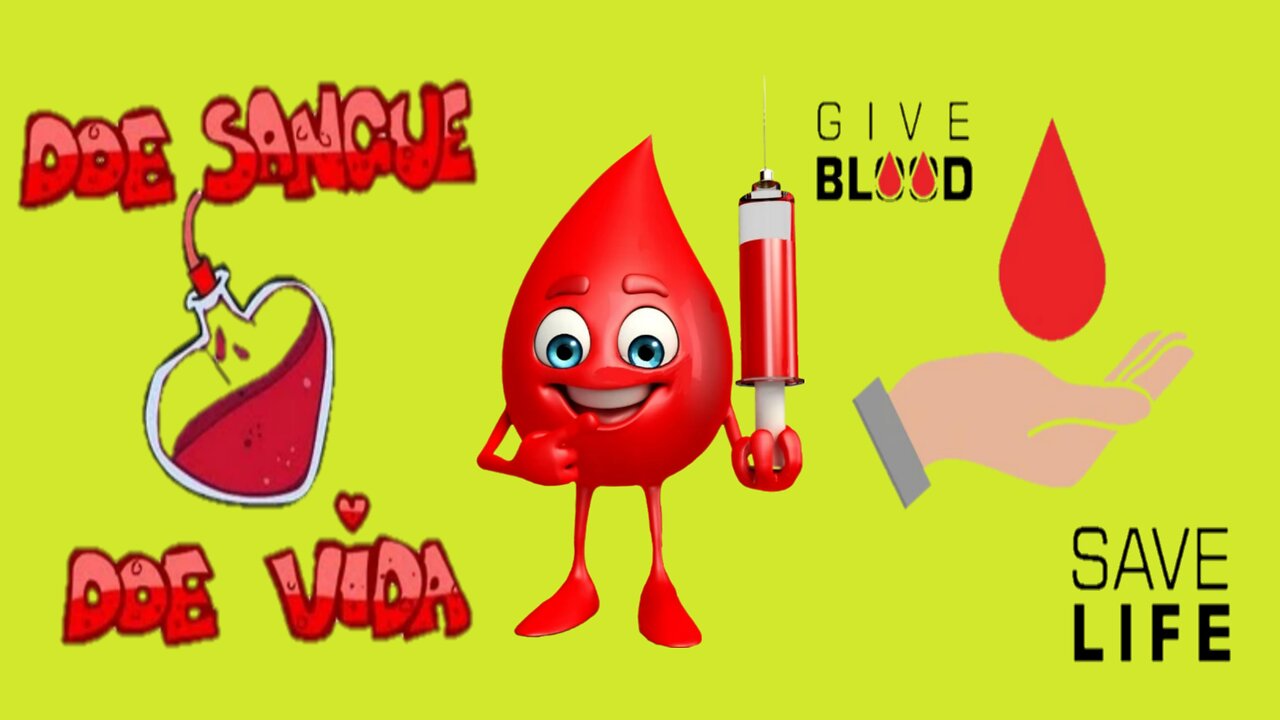Premium Only Content

give blood save life Importance of Blood Donation:
Importance of Blood Donation:
Emergency Situations: Blood is often needed in emergency situations, such as accidents, surgeries, or natural disasters.
Medical Conditions: Individuals with certain medical conditions, like cancer or blood disorders, may require regular blood transfusions.
Types of Blood Donation:
Whole Blood Donation: The most common type, where a person donates a unit of whole blood.
Plasma Donation: Involves donating only the plasma component of blood, which is rich in proteins.
Platelet Donation: Platelets are tiny cells that help blood to clot. Platelet donation is often used for cancer patients and those with clotting disorders.
Blood Types:
Blood is categorized into different types based on the presence or absence of certain antigens and antibodies. The most common blood types are A, B, AB, and O, and they can be either Rh-positive or Rh-negative.
Donor Eligibility:
Donors must meet certain eligibility criteria, including age, weight, and overall health.
A screening process is conducted to ensure the safety of both the donor and the recipient.
Frequency of Donation:
The frequency of blood donation depends on the type of donation and local regulations.
Whole blood donation is typically allowed every 8 to 12 weeks.
Blood Donation Process:
The donation process is relatively simple and usually takes about 10-15 minutes for whole blood donation.
After donation, individuals are provided with refreshments and rest to ensure they recover fully.
Voluntary and Non-Remunerative:
Blood donation is voluntary, and donors do not receive any monetary compensation for their donation. This ensures the act is driven by altruism and a desire to help others.
Community Blood Drives and Donation Centers:
Blood can be donated at designated blood donation centers or during community blood drives organized by hospitals, blood banks, or other organizations.
Health Benefits for Donors:
Regular blood donation has potential health benefits for donors, including reducing the risk of certain diseases and improving cardiovascular health.
Global and National Initiatives:
Various national and international organizations promote and coordinate blood donation efforts to ensure an adequate and safe blood supply.
If you are interested in donating blood, it is advisable to contact your local blood bank or donation center to get information on eligibility criteria and donation procedures. Donating blood is a noble and lifesaving act that contributes significantly to public health and healthcare systems.
-
 LIVE
LIVE
Scammer Payback
3 hours agoCalling Scammers Live
703 watching -
 1:00
1:00
Congresswoman Harriet Hageman
4 hours agoCongresswoman Harriet Hageman Rumble Rollout
8819 -
 LIVE
LIVE
Melonie Mac
1 hour agoGo Boom Live Ep 33!
238 watching -
 13:08
13:08
RealitySurvival
8 hours agoNorth American Union - Why THIS IS A BAD Idea!
1323 -
 DVR
DVR
Redacted News
3 hours agoWEF is in FULL PANIC MODE over Trump, LA wildfires a failure of liberal government | Redacted News
53.4K117 -
 DVR
DVR
vivafrei
8 hours agoInterview with Enrique Tarrio's Mother - Viva Frei Live
54.8K20 -
 53:07
53:07
Candace Show Podcast
2 hours agoBlake Lively VS Justin Baldoni: The Revenge of #MeToo | Candace Ep 128
45K60 -
 1:59:04
1:59:04
Darkhorse Podcast
5 hours agoThe 259th Evolutionary Lens with Bret Weinstein and Heather Heying
31.7K19 -
 1:42:19
1:42:19
Film Threat
5 hours agoHOLLYWOOD IS ON FIRE! | Hollywood on the Rocks
10.3K3 -
 9:53
9:53
Gun Owners Of America
5 hours agoConstitutional Concealed Carry Reciprocity Introduced to Congress!
27.6K9